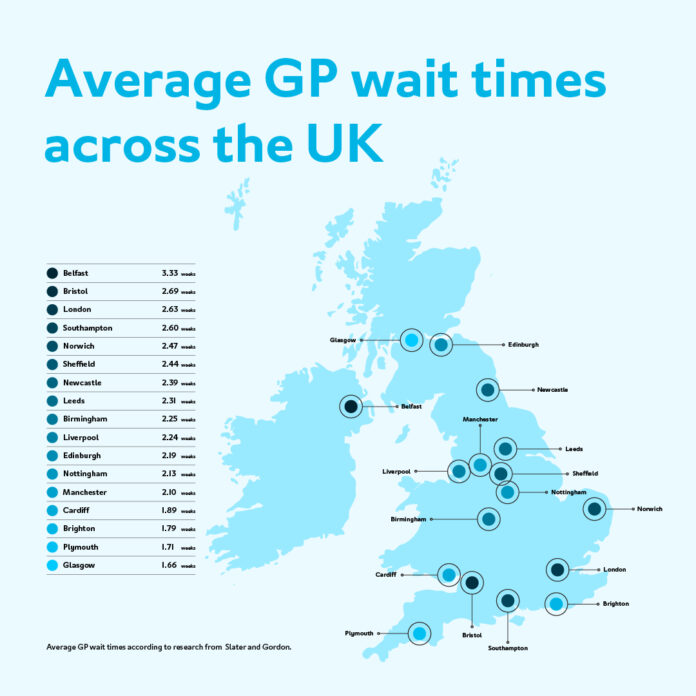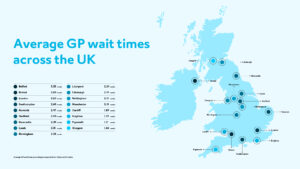With online booking systems, virtual appointments and a backlog of post pandemic patients, it seems harder than ever to get a face-to-face appointment with your GP.
Now, according to research with 2,000 general consumers from legal services provider, Slater and Gordon, the average wait time to see a GP in the UK is 2.35 weeks.
In Cardiff the waiting time is 1.89 weeks – among the shortest of any of major UK cities where Slater and Gordon conducted its survey.
Wait times are so long that 40% of people in Cardiff said they don’t even bother trying to get in touch with their GP anymore. In fact, one in five people in Cardiff (20%) have considered going private due to long NHS wait times with 33% of people abandoning the NHS completely in favour of paid for healthcare.
The amount of time people can expect to wait to visit their GP varies from city to city with those in Belfast waiting the longest and Glaswegians getting appointments the most quickly. The full list, from longest to shortest wait is:
Belfast – 3.33 weeks
Bristol – 2.69 weeks
London – 2.63 weeks
Southampton – 2.60 weeks
Norwich – 2.47 weeks
Sheffield – 2.44 weeks
Newcastle – 2.39 weeks
Leeds – 2.31 weeks
Birmingham – 2.25 weeks
Liverpool – 2.24 weeks
Edinburgh – 2.19 weeks
Nottingham – 2.13 weeks
Manchester – 2.10 weeks
Cardiff – 1.89 weeks
Brighton – 1.79 weeks
Plymouth – 1.71 weeks
Glasgow – 1.66 weeks
These figures are particularly worrying given that the government says all patients need to be able to be seen by a GP within two weeks.
Emma Doughty, head of clinical negligence at Slater and Gordon, said: “Whilst struggling to get a GP appointment isn’t necessarily negligent, delayed appointments leading to delayed referral and diagnosis can have serious implications for patients. If, for example, cancer was suspected and the appointment was delayed, it could spread and consequently the prognosis may differ than if the patient had been seen and referred swiftly.
“Often, people aren’t aware how to advocate for themselves in a healthcare setting and they simply accept the treatment that is initially advised. We believe that education and awareness are important in ensuring individuals can make informed decisions about their health and wellbeing. By sharing accessible tools and knowledge as part of our advocacy hub, we want to empower individuals and improve health outcomes for everyone.”
To help people who are concerned that they have experienced poor levels of care, Slater and Gordon has created an advocacy hub with downloadable template letters you can share with healthcare providers reporting poor levels of care. To access this free of charge content, visit here.
Help keep news FREE for our readers
Supporting your local community newspaper/online news outlet is crucial now more than ever. If you believe in independent journalism, then consider making a valuable contribution by making a one-time or monthly donation. We operate in rural areas where providing unbiased news can be challenging. Read More About Supporting The West Wales Chronicle



























